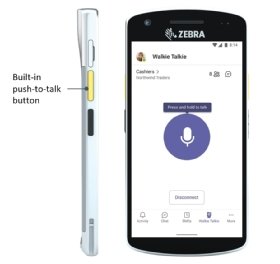
Getty Images/iStockphoto
Microsoft bolsters Teams for frontline workers
The latest Microsoft Teams features add walkie-talkie functionality to Zebra Technologies devices and integrate scheduling and training to frontline worker apps.
Microsoft has added to Teams a slate of features that make the collaboration platform more useful to retail, healthcare, hospitality and assembly-line employees. The release is a continuation of a campaign that started in 2018 to tap into the frontline worker market.
This week, Microsoft added Teams' walkie-talkie capability to more mobile devices, connected Teams to additional frontline worker applications and made it easier to access corporate information.
Some of the features build upon Microsoft's previous attempts to appeal to workers who need to do their jobs in person, like nurses, retail employees and factory workers. This week's additions further Microsoft's efforts to tie frontline worker scheduling into Teams and offer training materials through the platform.
Microsoft pitched the latest release as technology that can add efficiencies to the job of non-office workers. The company worked with manufacturer Blum to make it easier for its employees to contact corporate offices, request days off and access company information.
Non-office workers, who make up most of the U.S. workforce, are a significant market opportunity for collaboration vendors, said Constellation Research analyst Dion Hinchcliffe.
"The runaway growth of UC offerings from Microsoft, Zoom and others will soon run out of headroom, and so [those vendors] need to seek new pastures," Hinchcliffe said. "There is no question that frontline workers are one of the next big battlegrounds for UCaaS."
Microsoft competes with Cisco, Fuze, Twilio and Zoom, and specialty vendors like Orion Labs and Beekeeper, which have served the frontline-worker market for years, said 451 Research analyst Raul Castanon.
Microsoft expanded its Teams walkie-talkie feature to Zebra Technologies mobile devices for frontline workers, as well as iPhones and iPads. The functionality allows workers to push a button on the devices to talk with their colleagues on Teams. The capability is available on various Zebra devices, including those designed for scanning, harsh conditions and retail environments.
Microsoft will also connect Zebra's Reflexis Workplace Scheduler software to Teams this month. The integration lets shift workers access scheduling information, and bosses manage scheduling and shift changes. Teams has a built-in tool called Shifts to manage worker schedules.

Microsoft intends to let frontline employees access training materials through Teams. A feature coming later this month will allow a business to assign training from providers like SAP and Saba Cloud. Microsoft said it would also partner with learning providers EdCast and OpenSesame in January and February, respectively.
Beyond Teams, Microsoft has made other moves centered on frontline work. An upcoming update to the company's device management software, Endpoint Manager, will let IT admins set off an audio alert to help an on-site employee track down a lost device. Microsoft plans to release the capability by the end of March.
Microsoft will launch a cloud offering aimed at the retail industry in February. Microsoft Cloud for Retail will use AI and retailer data to optimize supply chains and create and manage customer profiles. Microsoft previously launched industry-specific cloud offerings for financial services, manufacturing and healthcare, among others.
Mike Gleason is a reporter covering unified communications and collaboration tools. He previously covered communities in the MetroWest region of Massachusetts for the Milford Daily News, Walpole Times, Sharon Advocate and Medfield Press. He has also worked for newspapers in central Massachusetts and southwestern Vermont and served as a local editor for Patch. He can be found on Twitter at @MGleason_TT.







